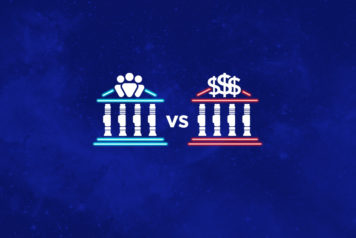Payday Loans & How to Avoid Them
We’ve all been there. It’s the middle of the month and unexpectedly an event happens like a busted pipe or car issues that requires an immediate solution. Unfortunately, it’s weeks until payday, and you don’t have the money you need right now.
Payday loans, which are also called a cash advance, check advance and post-dated check loans, have become increasingly popular with 12 million Americans using payday lenders annually, according to Pew Research. Turns out, preying on people in a bind can be a pretty lucrative business. The Center for Responsible Lending says payday loans earn more than $3.4 billion annually from fees paid by borrowers, and almost two-thirds of these fees – or $2.6 billion – come when the borrower must roll the loan over again because they can’t pay the loan back by the next payday.
Payday Loan Breakdown
These quick, no-questions-asked loans can be obtained pretty easily. The borrower writes a personal check payable to the lender for the amount he or she wishes to borrow, plus a fee, which is typically in the range of 10% to 25% of the amount. That check is held for up to four weeks. At that time, the check is redeemed by the borrower by paying the face amount of the check or allowing it to be cashed. If the borrower cannot cover the check, it can be rolled over for another term by writing another check with another set of fees added to the balance.
Consumers may be misled into thinking that payday loans are a cheap and convenient way of borrowing money for the short term. However, with average annual interest rate ranging from 390% to 871%, payday loans are no bargain. This often leaves the borrower with little or no money for living expenses. The result is that the borrower pays another round of charges and fees and obtains no additional cash in return.
Consider this example: A check of $200 with a 15% fee ($30) is applied. The amount paid to the borrower is $170 and the lender receives $30, which translates to an APR of 458% if the loan is repaid in two weeks. If it is rolled into a new payday loan, an additional fee of $30 is charged, the loan is raised to $230, and the APR jumps to 917%. In other words, it could cost $60 to borrow $170 for one month.
How You Can Avoid The Payday Loans Cycle
Ideally, you’ll have an emergency fund, a credit line or a HELOC, you can use for those sudden, unexpected crises. Sometimes, though, you don’t have the best tools or options available. Here are a few options to help guide you away from a payday loan.
1. Breathe. And then think through your options.
A financial crisis seems like an immediate and overwhelming threat. The promises of immediate cash can lure you towards payday loans and away from other options or solutions. Resist the impulse to act quickly, and instead think through your issue. While financial needs are very real, time can often allow your mind to think clearly through possible options.
2. Talk to your financial institution.
Short-term loans often provide much better rates than payday loans. You’ll have a rate and a payment plan you can live with, and you won’t have to worry about hidden fees, unexpected rate hikes or payments you can’t afford. For example, WeStreet Credit Union offers FastCash, which is a alternative, short-term solution to payday loans for our members designed to cover unexpected cash needs. Approval for this loan, for which amounts do not exceed $1,000, comes without a credit check, as approval is based on the member’s relationship with WeStreet. In fact, members apply online and can get approved in less than a minute.
3. Sell something of value.
Many times, you can use a crisis as an opportunity to sell items you no longer need but still have monetary worth. Maybe you have a ring you inherited that holds a lot of value but little sentimental significance. Or maybe you could sell a car and share a remaining car between the family. Selling something that no longer holds value to you but would be valuable to someone else is a way to cover your essential needs without increasing your debt.
4. Consolidate debt to create more monthly income.
Often, people need payday loans just to make it until the next month. Instead, consider debt consolidation to lower your monthly debt payments and allow for more budget flexibility from month to month. For example, by consolidating your credit cards into one fixed rate loan you will have one easier to manage single payment which may allow you to pay off your debt faster than only paying the minimum amount on each card monthly.
5. Take out equity from your car.
If you have been paying down your car for a while, or if it is paid off, leverage the equity in your car to pay for the new needs you have. You’ll take out a new loan on your car and make monthly payments to build that equity back.
6. Borrow from alternative sources of savings.
As a last resort, but before you get a payday loan, talk to a financial adviser about whether it is an option to tap into any retirement, life insurance or other investment accounts. Since you might incur penalties, it is always best to talk to a professional before making this choice.
Obviously, financial crises are softened by your own savings to use to cushion the blow. Those without savings to fall back on often do not have much room in their budget to pull additional resources to start saving more. However, even finding $5 a week to tuck away for later can add up. Review your budget and find ways to trim back now so you’ll be in better shape next time trouble comes calling.
This article is for educational purposes only. WeStreet Credit Union makes no representations as to the accuracy, completeness, or specific suitability of any information presented. Information provided should not be relied on or interpreted as legal, tax or financial advice. Nor does the information directly relate to our products and/or services terms and conditions.


